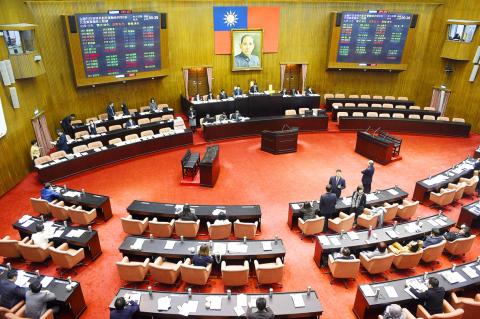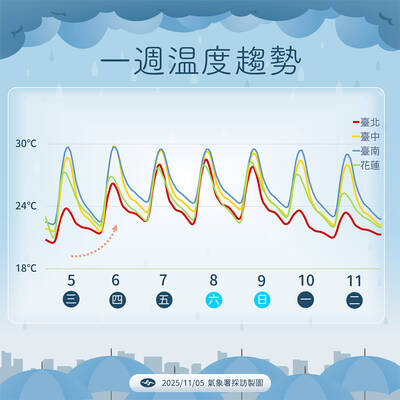Lawmakers yesterday passed the Act on Financial Technology Innovations and Experiments (金融科技創新實驗條例) in a bid to upgrade the nation’s financial sector by granting technology firms more leeway when experimenting with innovative financial services.
The act was inspired by a sandbox proposed by the UK Financial Conduct Authority for field-testing financial services by tech firms.
Firms that have passed an assessment to use the sandbox would be allowed to bypass — in part or in full — certain regulations after gaining the approval of the Financial Supervisory Commission (FSC), the act stipulates.

Photo: Chen Chih-chu, Taipei Times
The FSC is to consult responsible agencies when it wants a test financial service to be exempted from certain rules, with the exception of the Money Laundering Control Act (洗錢防制法) and the Act Against the Threats of Hacking (資恐防治法), which cannot be exempted, it says.
In addition, a review committee is to be established under the FSC to review plans.
To promote innovation, the committee is required to hire experts from the private sector for between one-third and half of its staff, with the rest composed of representatives from government agencies, the act states.
To avoid profitability being harmed by red tape, the committee is to decide within 60 days of a submission whether it qualifies for the sandbox. Approved plans would then be given an 18-month time frame within which firms would be allowed to launch trial runs of their services.
The 18-month period may be extended to no more than 36 months at the discretion of the FSC.
The review committee is to submit a report to the Legislative Yuan detailing the results of a project and which regulations should be changed within 90 days of the end of a trial, so that a new service may be put on the financial market after necessary legal amendments are approved.
People who experience financial losses as a result of their participation in a financial service test are protected by the Financial Consumer Protection Act (金融消費者保護法) and should file complaints with the Financial Ombudsman Institution.
Democratic Progressive Party Legislator Karen Yu (余宛如), who initiated the bill, said that the passage of the act makes Taiwan the first nation in the world to introduce a financial regulatory sandbox law.
The act would greatly increase the flexibility of financial-oriented regulations that have been limiting innovation, Yu said, adding that it would also break down barriers between sectors, so that tech and financial firms can work together seamlessly.
The sandbox model can also be applied to a variety of fields, such as the research and development of drones, she added.
Chinese Nationalist Party (KMT) Legislator Jason Hsu (許毓仁) said the three-year trial period offered by the sandbox is the longest in the world and lauded the act as “ushering in a new era for Taiwan’s financial technology.”
He said the legislation came later than some would have hoped, as the nation’s achievements in innovative financial services have trailed behind several others in the region such as Hong Kong and South Korea, but the passage of the act was “better late than never.”

Three Taiwanese airlines have prohibited passengers from packing Bluetooth earbuds and their charger cases in checked luggage. EVA Air and Uni Air said that Bluetooth earbuds and charger cases are categorized as portable electronic devices, which should be switched off if they are placed in checked luggage based on international aviation safety regulations. They must not be in standby or sleep mode. However, as charging would continue when earbuds are placed in the charger cases, which would contravene international aviation regulations, their cases must be carried as hand luggage, they said. Tigerair Taiwan said that earbud charger cases are equipped

Foreign travelers entering Taiwan on a short layover via Taiwan Taoyuan International Airport are receiving NT$600 gift vouchers from yesterday, the Tourism Administration said, adding that it hopes the incentive would boost tourism consumption at the airport. The program, which allows travelers holding non-Taiwan passports who enter the country during a layover of up to 24 hours to claim a voucher, aims to promote attractions at the airport, the agency said in a statement on Friday. To participate, travelers must sign up on the campaign Web site, the agency said. They can then present their passport and boarding pass for their connecting international

UNILATERAL MOVES: Officials have raised concerns that Beijing could try to exert economic control over Kinmen in a key development plan next year The Civil Aviation Administration (CAA) yesterday said that China has so far failed to provide any information about a new airport expected to open next year that is less than 10km from a Taiwanese airport, raising flight safety concerns. Xiamen Xiangan International Airport is only about 3km at its closest point from the islands in Kinmen County — the scene of on-off fighting during the Cold War — and construction work can be seen and heard clearly from the Taiwan side. In a written statement sent to Reuters, the CAA said that airports close to each other need detailed advanced

UNKNOWN TRAJECTORY: The storm could move in four possible directions, with the fourth option considered the most threatening to Taiwan, meteorologist Lin De-en said A soon-to-be-formed tropical storm east of the Philippines could begin affecting Taiwan on Wednesday next week, the Central Weather Administration (CWA) said yesterday. The storm, to be named Fung-wong (鳳凰), is forecast to approach Taiwan on Tuesday next week and could begin affecting the weather in Taiwan on Wednesday, CWA forecaster Huang En-hung (黃恩鴻) said, adding that its impact might be amplified by the combined effect with the northeast monsoon. As of 2pm yesterday, the system’s center was 2,800km southeast of Oluanbi (鵝鑾鼻). It was moving northwest at 18kph. Meteorologist Lin De-en (林得恩) on Facebook yesterday wrote that the would-be storm is surrounded by